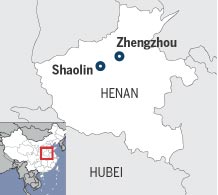Firm looks to build resort to draw more people to temple
By Satarupa Bhattacharjya ( China Daily ) Updated: 2016-10-08 07:37:56
As a birthplace of the Chinese civilization, Henan draws visiting crowds both from home and abroad for most of the year but Dengfeng, in particular, could see tourist numbers rise, if the small city in the northern outskirts of provincial capital Zhengzhou is endowed with more hotels.
A step in the direction is being taken by CTS Songshan Shaolin Culture Tourism Co Ltd, the Hong Kong-based company that manages tourism for the Shaolin establishment.
The company is looking to build a resort town in Liu You, an area at some 5 kilometers from the world heritage site, located in the foothills of the Song Mountain.
"We've got the land to develop this township," Dong Yixiao, the company's marketing manager, tells China Daily. "We'd like to attract more people to Shaolin."
"Tourists now need to find hotels in Dengfeng," he says, but doesn't give a timeline for the project's takeoff or completion.
Although the county-level city itself isn't far from Shaolin, the options of hotels in the vicinity are few. In addition, the prospects of local employment would increase if the area is turned into a destination getaway without perhaps interfering with the quiet lifestyle of those dedicated to the order.
The premises of Shaolin receive up to 6,000 tourists on a daily basis, with the figure reaching 40,000 during the Chinese national holidays and the annual summer break in schools. A daylong entry ticket covering seven sites costs 100 yuan. Children of or under 1.2 meters height and people aged 60 and above are allowed in free.
Other tickets-for ropeway rides and visits to associated scenic spots-cost between 30 and 80 yuan.
Foreign tourists make up roughly 10 percent of the total number, Dong says.
The temple, monastery and surrounding locales are open to the public from morning to evening on most days of the year. But heavy snowfall leads to their temporary closure in the winter. Dengfeng is entrenched in subtropical and temperate vegetation and usually gets a good share of the yearly rainfall over Henan.
Shaolin's central compound spread over 2 kilometers, includes pagodas, some built in the Song Dynasty (AD 960-1279); a cave; a waterfall; a stargazing observatory, which the temple says is among the world's oldest such relics; significant architectural remains of the Han Dynasty (206 BC-AD 220); and views of the mist-filled Song Mountain geological park.
In 2009, the local government of Dengfeng handed over tourism management of Shaolin to the company that today works on a staff strength of 600, earning about 250 million yuan in annual revenues from tourism here. The outsourcing was initiated in an attempt to present a modern face of this symbol of ancient China.
Other than maintaining a website in English, the temple has an account on Sina Weibo, China's Twitter-like platform. It wants to launch a phone app and a video game, Dong says.
The monks of Shaolin cook and feed la ba, a Chinese gruel of rice, vegetables and water, to tourists outside the temple gates on Dec 8 every year as part of a Buddhist outreach.
Qi Xin contributed to this story.
|
|
|
|
|
|
|
|

























 Raymond Zhou:
Raymond Zhou: Pauline D Loh:
Pauline D Loh: Hot Pot
Hot Pot Eco China
Eco China China Dream
China Dream China Face
China Face






